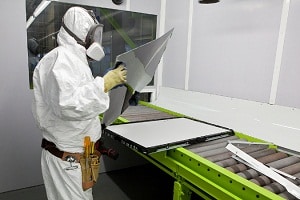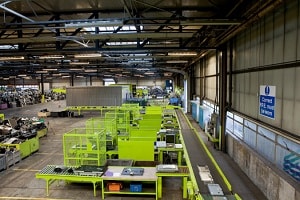The 250,000 project, based at the companys Preston headquarters, aims to address both the time involved in dismantling the complex flat panel display complex units and the hazardous mercury backlights that are present in each unit.

Recycling Lives claims that the facility, which it says is the first of its kind in England, offers a best practice solution for both these issues that has been developed with the support of four years of research.
The tonnage of waste flat panel displays (FPDs) such as laptop monitors and LCD TVs generated in the UK is expected to increase significantly over the next few years as those purchased as a replacement for traditional cathode ray tube (CRT) equipment reach the end of their operational life.
However, research published by the Waste and Resources Action Programme (WRAP) last year raised significant concerns over the health and safety problems created for reprocessing by the mercury in the display units (see letsrecycle.com story).
These concerns were acknowledged by Recycling Lives, which noted that, due to concern over mercury vapours escaping during the manual dismantling of FPDs, waste management companies have shied away from reprocessing them.
But, Recycling Lives claims that its facility, which has the capacity to process up to 1,000 units a day at full capacity, takes into account these stark health and safety issues.
In a statement, it said: The development of the Recycling Lives FPD processing line has involved significant investment into health and safety testing, sophisticated mercury analysing equipment and a specially designed mercury-safe dismantling room, in addition to specialist protective equipment and training for staff on how to work safely in a potentially hazardous environment.
Process
The Recycling Lives process involves staff removing the plastic and metal components from units before the remaining screen and mercury-filled fluorescent tubes enter the sealed mercury-safe room on a conveyor belt.
Staff working in the room are rotated at what Recycling Lives describes as regular short intervals to minimise the strain caused by working in heavy face masks and body-suits as they separate the mercury back lights from the FPD screens.

The company also replaces the air in the room every 60 seconds and ensures all mercury is treated, sucked out into a separate unit and stored away from all other areas in preparation for external recycling.
Commenting on the process, the strategic development manager at the plant, David Allen, said: Our ground-breaking flat panel display recycling facility is the result of years of study in conjunction with the University of Central Lancashire into the issues and complexities of FPD recycling.
All aspects of the process have been carefully considered and the resultant processing line which has been developed is something we are very proud of at Recycling Lives.
He added: It is very important to us that we have a line which is a flagship FPD facility which sets the trend for how to correctly handle these units. We are now keen to engage with as many stakeholders as possible to ensure we can operate the line to as near to its capacity as possible.
Research
The plant has been developed under the guidance of industry experts including Timothy McDonnell from the University of Central Lancashire who, according to the Recycling Lives, has been at the forefront of FPD research for the last four years.
The speed of reprocessing has been addressed by breaking down the disassembly process for FPDs into stages, with preparatory studies being carried out to compare FPD and CRT recycling. As a result the company has looked to incorporate the most effective procedures from CRT recycling into its FPD method.
Related links
The facility is expected to be able to process up to 1,000 units a day at full capacity, and Recycling Lives said that, while current levels were lower than this, they were growing at a rapid pace.









Subscribe for free